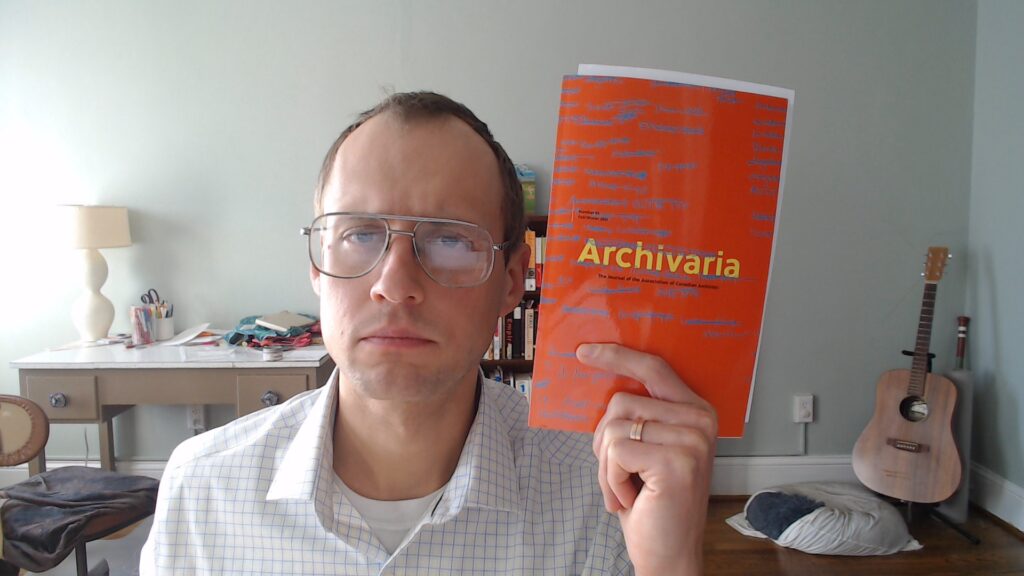loose ends
I was pretty overwhelmed by a mix of confusing emotions when this came in the mail a few weeks ago:

It’s the latest issue of my favorite archives journal, Archivaria, which just happens to feature an article that I developed out of my dissertation research. I don’t really want to talk about the contents of the article in this post, even though I remain pretty jazzed about it. I’d encourage anyone who’s interested read the article, of course, and to definitely check out the digital arts platform that served as the case study for the research, Paper-Thin. I was enthralled by the artwork featured on the platform years ago and doing a whole dissertation centered around that project did not burn me out. Special thanks to Daniel Smith and Cameron Buckley, the curators of Paper-Thin, and all the artists featured for their generous interest and participation in the research. If you can’t already tell, I’d rather be a little bit indulgent on this personal blog and sort through my thoughts and feelings on seeing this research published.
Finally seeing this work in print certainly feels like the culmination of…something. I defended my dissertation in January 2020 — so right before the Covid-19 lock downs. I feel very fortunate that I actually got to do my dissertation defense in person and have that experience, though the pandemic has robbed me of anything close to my anticipated experience of completing my PhD and starting my academic career. The last (and only) time I’ve interacted with my now-colleagues at UNCG in person was at my job interview back in February 2020. I’ve only been onto campus and worked in my office a handful of times. I don’t think I’ll ever get closure on finishing my PhD, and I don’t think I’ll ever really have a clear marker for when it feels like I’ve truly started in my current position, but the publication of this article feels like the closest I’ll get to that demarcation of a turning point.
I feel guilty mourning the fact that I’ve had to start my dream job under less-than-ideal circumstances when so many people have experienced the loss of jobs, along with, principally of course, the staggering loss of life caused by the pandemic. But I do feel like the pandemic has seriously hampered the start of my academic career, inhibiting me from starting collaborations with my UNCG colleagues and accessing resources that would advance my scholarship. I’m far from alone in this as a whole generation of junior faculty members are struggling to make progress toward tenure while adjusting to a pandemic with no end in sight. Personally, I feel that UNCG has had a good approach to this so far, granting all junior faculty extensions to their tenure clocks and offering mechanisms in annual reviews to register how the pandemic has impacted their work. The university has also gestured at a climate of compassion and empathy that seems genuine. I guess we’ll see what happens when it comes time to actually review tenure cases.
In light of this, seeing the research in print gives me, overall, a sense of affirmation. I feel truly honored that my work has entered into the critical scholarly discourse fostered by Archivaria. I’ve been working in archives for about 10 years now, and developing as an archival studies scholar and educator for about the past 6 of those years. Throughout that time, I’ve encountered the most engaging and challenging ideas about archives and the archival endeavor in the pages of this journal — most notably, the work of the late Terry Cook, whose writing has consistently broadened my perspective on archives. As I prepared my dissertation research for peer-reviewed publication, this journal was the clear choice for a publication venue. It’s honestly so rewarding to see research that I’ve dedicated so much time and energy to get disseminated through this publication in particular. I feel like I’m fully stepping into a conversation that I’ve been a witness to for a while now. My plan is for this to be the many of such forays into that conversation, but I’d be satisfied if this is all I got.
I’ve also been thinking about the many people who have supported this research effort, in addition to the artists and others who directly participated in the research itself. I remain hugely indebted to my dissertation committee at UNC-Chapel Hill — Cal Lee, Denise Anthony, Amelia Gibson, Cary Levine, and Ryan Shaw — for their support and guidance throughout the research. This group was a dream team for me of folks who I admired and respected but who also always treated me as a colleague even as they provided guidance and mentorship. I want to extend sincere gratitude to the entire staff at the journal, too — the whole publishing process was driven by thoughtful, careful, and rigorous work, all with the aim of putting out the highest-quality scholarship possible. This article benefited in particular from the most thorough copy editing that I’ve ever experienced.
Still, getting this journal issue has surfaced and exacerbated anxieties: my dissertation research is now as finished as it’s going to be, and it’s also really time to work on what’s next. I’ve made some tentative steps into what I want to work on next, evidenced by the previous few posts on the blog, but it’s all still fairly early on and undefined. Despite facing a chasm of uncertainty, I am in the enviable position of starting something new. The dissertation was my first opportunity to really chart a course that I wanted to explore in my research, and now I get to start that again, though with the lessons that I learned from the previous effort. That’s a good place to be in, even if there’s a terrifyingly eternal pandemic going on.
